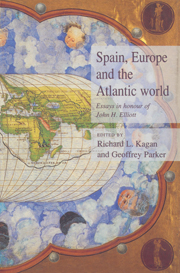Book contents
- Frontmatter
- Contents
- Notes on contributors
- Acknowledgements
- List of abbreviations
- Sir John Elliott: an appreciation
- Introduction
- PART I Power and propaganda: the world of the court
- 1 Twin souls: monarchs and favourites in early seventeenth-century Spain
- 2 Taxation and political culture in Castile, 1590–1640
- 3 Clio and the crown: writing history in Habsburg Spain
- PART II The pattern of society: community and identity in Habsburg Spain
- PART III Spain and its empire
- Index
2 - Taxation and political culture in Castile, 1590–1640
Published online by Cambridge University Press: 04 August 2010
- Frontmatter
- Contents
- Notes on contributors
- Acknowledgements
- List of abbreviations
- Sir John Elliott: an appreciation
- Introduction
- PART I Power and propaganda: the world of the court
- 1 Twin souls: monarchs and favourites in early seventeenth-century Spain
- 2 Taxation and political culture in Castile, 1590–1640
- 3 Clio and the crown: writing history in Habsburg Spain
- PART II The pattern of society: community and identity in Habsburg Spain
- PART III Spain and its empire
- Index
Summary
On 12 June 1635, the count of Castrillo, a member of the council of Castile and nephew of the count-duke of Olivares, composed a hastily scribbled note to his confessor. In his note Castrillo had a number of pressing questions to ask. Can the king require his subjects to serve him personally in arms? What obligation do they have to serve him with their wealth, especially the members of the aristocracy and the bishops? What is the obligation of the Cortes to concede taxes? Does it matter whether the war which serves to justify the taxes is fought at home or abroad? On what grounds can a member of parliament, a proctor (procurador), vote for taxes in good conscience? What is the extent of the Cortes' obligation to approve new taxes when it is obvious to all that the kingdom is impoverished? In short, ‘how, given the widest latitude possible, might His Majesty best be served within the limits of conscience?’ These questions, along with the confessor's careful response, provide a unique and valuable insight into the political culture of Olivares' Castile – a culture in which theology and a preoccupation with informed conscience significantly shaped the context in which political decisions were made.
At the time Castrillo raised his questions, the atmosphere at the royal court in Madrid was tense. Spain had recently declared war on France and military preparations were in high gear. Castrillo's own preoccupations were financial.
- Type
- Chapter
- Information
- Spain, Europe and the AtlanticEssays in Honour of John H. Elliott, pp. 48 - 72Publisher: Cambridge University PressPrint publication year: 1995
- 3
- Cited by



